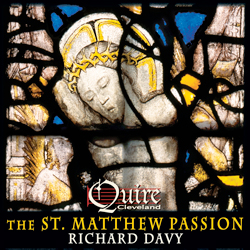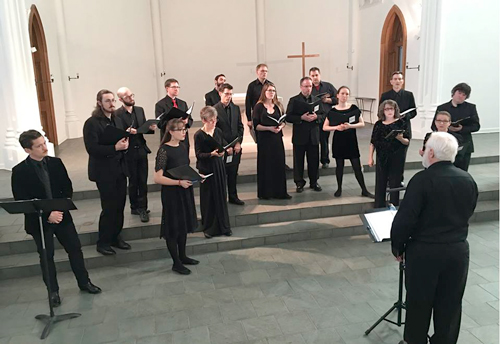by Daniel Hathaway

We know little about Davy other than that he was a student at Magdalen College, Oxford at the time it began occupying its current site, and became its master of the choristers from 1490-1492. Perhaps he also worked at Exeter Cathedral.
Davy’s setting follows the practice of other medieval passion settings: the narrative parts — here the Evangelist and Jesus — are sung by soloists using Sarum Chant formulas. Departing from tradition, Davy sets the words of all the other minor characters in the Gospel story as well as the crowd to four-part choral polyphony. And what polyphony! The arching lines of the soprano voice, the sophistication of the sometimes florid counterpoint, and the contrasting use of homophonic textures will be familiar to admirers of English music of this period.
The original was, of course, in Latin. Duffin chose to use William Tyndale’s vernacular text for his reconstruction, restoring an immediacy to the drama that might otherwise be lost on 21st century ears. Perhaps he might have gone one step further and modernized verb forms that sound a bit stilted after a while.
Charged with declaiming all that text to limited melodic patterns, tenor Owen McIntosh keeps the story lively with subtle inflections and excellent diction. Bass Jeffrey Strauss’s Jesus is robust and dramatic. Duffin and the sixteen professional voices of Quire respond vividly to their parts in the story line.
A bonus at the end of the Passion is Sheryngam’s expressive motet, Ah, Gentle Jesu, from the Fayrfax Manuscript, which serves the same cathartic purpose as the final choruses in the Bach Passions.
If you’re fond of church music and divide your recordings into seasonal categories, this CD is a must for listening during Holy Week. Part of Duffin’s inspiration to restore Davy’s Passion was to create a performing edition that other choirs could use to present the work. Quire Cleveland’s exemplary singing on this recording should both inspire more performances, and serve as a guide for those who would like to take the Davy on themselves.
Michael Bishop of 5/4 Productions edited this recording from all three of Quire’s live performances in Akron, Cleveland and Cleveland Heights in April 2017. That can’t have been easy, but he made it work nicely.
Published on ClevelandClassical.com December 13, 2017.
Click here for a printable copy of this article




